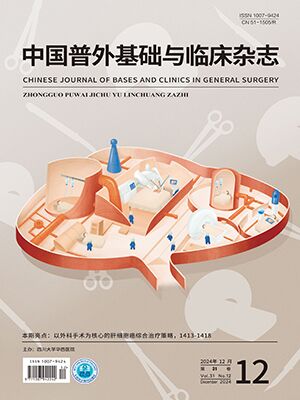| 1. |
de Rooij T, van Hilst J, van Santvoort H, et al. Minimally invasive versus open distal pancreatectomy (LEOPARD): a multicenter patient-blinded randomized controlled trial. Ann Surg, 2019, 269(1): 2-9.
|
| 2. |
van Hilst J, de Rooij T, Klompmaker S, et al. Minimally invasive versus open distal pancreatectomy for ductal adenocarcinoma (DIPLOMA): a pan-European propensity score matched study. Ann Surg, 2019, 269(1): 10-17.
|
| 3. |
Asbun HJ, Moekotte AL, Vissers FL, et al. The miami international evidence-based guidelines on minimally invasive pancreas resection. Ann Surg, 2020, 271(1): 1-14.
|
| 4. |
Korrel M, Jones LR, van Hilst J, et al. Minimally invasive versus open distal pancreatectomy for resectable pancreatic cancer (DIPLOMA): an international randomised non-inferiority trial. Lancet Reg Health Eur, 2023, 31: 100673. doi: 10.1016/ j.lanepe.2023.100673.
|
| 5. |
Strasberg SM, Drebin JA, Linehan D. Radical antegrade modular pancreatosplenectomy. Surgery, 2003, 133(5): 521-527.
|
| 6. |
Strasberg SM, Linehan DC, Hawkins WG. Radical antegrade modular pancreatosplenectomy procedure for adenocarcinoma of the body and tail of the pancreas: ability to obtain negative tangential margins. J Am Coll Surg, 2007, 204(2): 244-249.
|
| 7. |
Mitchem JB, Hamilton N, Gao F, et al. Long-term results of resection of adenocarcinoma of the body and tail of the pancreas using radical antegrade modular pancreatosplenectomy procedure. J Am Coll Surg, 2012, 214(1): 46-52.
|
| 8. |
Takahashi A, Mise Y, Watanabe G, et al. Radical antegrade modular pancreatosplenectomy enhances local control of the disease in patients with left-sided pancreatic cancer. HPB (Oxford), 2023, 25(1): 37-44.
|
| 9. |
Tang W, Zhang YF, Zhao YF, et al. Comparison of laparoscopic versus open radical antegrade modular pancreatosplenectomy for pancreatic cancer: a systematic review and meta-analysis. Int J Surg, 2022, 103: 106676. doi: 10.1016/j.ijsu.2022.106676.
|
| 10. |
Zhang H, Li Y, Liao Q, et al. Comparison of minimal invasive versus open radical antegrade modular pancreatosplenectomy (RAMPS) for pancreatic ductal adenocarcinoma: a single center retrospective study. Surg Endosc, 2021, 35(7): 3763-3773.
|
| 11. |
Wu EJ, Kabir T, Zhao JJ, et al. Minimally invasive versus open radical antegrade modular pancreatosplenectomy: a meta-analysis. World J Surg, 2022, 46(1): 235-245.
|
| 12. |
Lee SH, Kang CM, Hwang HK, et al. Minimally invasive RAMPS in well-selected left-sided pancreatic cancer within Yonsei criteria: long-term (>median 3 years) oncologic outcomes. Surg Endosc, 2014, 28(10): 2848-2855.
|
| 13. |
Sato S, Oba A, Kato T, et al. Feasibility of laparoscopic radical antegrade modular pancreatosplenectomy (RAMPS) as a standard treatment for distal resectable pancreatic cancer. Langenbecks Arch Surg, 2023, 408(1): 217. doi: 10.1007/s00423-023-02942-0.
|
| 14. |
Sutton TL, Potter KC, Mayo SC, et al. Complications in distal pancreatectomy versus radical antegrade modular pancreatosplenectomy: a disease risk score analysis utilizing national surgical quality improvement project data. World J Surg, 2022, 46(7): 1768-1775.
|
| 15. |
Klompmaker S, Peters NA, van Hilst J, et al. Outcomes and risk score for distal pancreatectomy with celiac axis resection (DP-CAR): an international multicenter analysis. Ann Surg Oncol, 2019, 26(3): 772-781.
|
| 16. |
Yoon SJ, Park SJ, Yoon YS, et al. 15-year experience of distal pancreatectomy with celiac axis resection (DP-CAR) for pancreatic cancer-a Korean nationwide investigation. Cancers (Basel), 2023, 15(15): 3850. doi: 10.3390/cancers15153850.
|
| 17. |
Ikoma N, Katz MHG. Improving outcomes after distal pancreatectomy with celiac axis resection (DP-CAR): as always, it is all about patient selection. Ann Surg Oncol, 2019, 26(3): 703-704.
|




